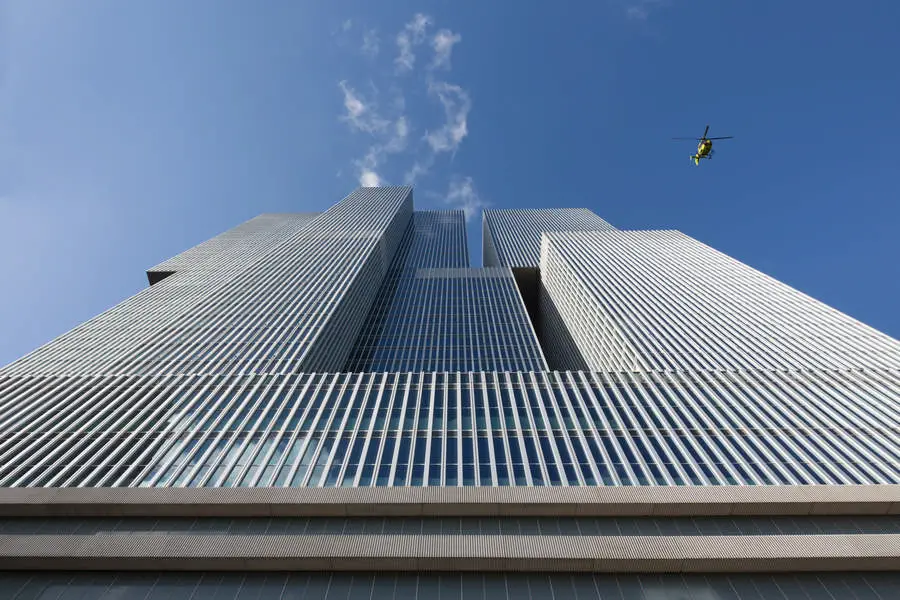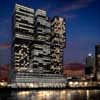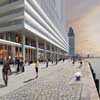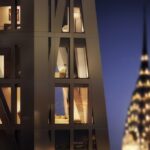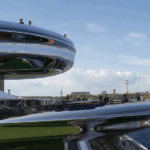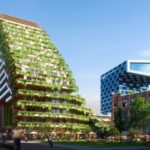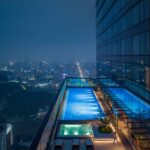De Rotterdam, Wilhelminapier Towers, Dutch OMA Building Project News, Design, Property Images
De Rotterdam : Wilhelminapier Buildings
Wilhelminapier Development Rotterdam design by OMA, The Netherlands
6 Dec 2013
De Rotterdam
OMA completes De Rotterdam
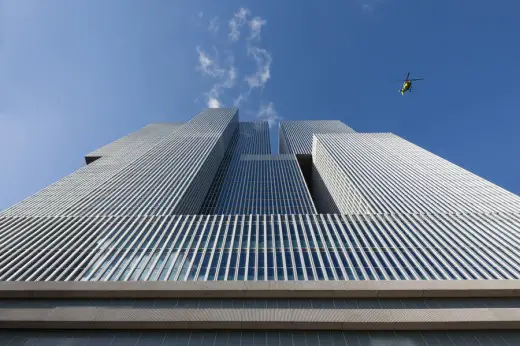
image courtesy of OMA; photography by Ossip van Duivenbode
De Rotterdam, a mixed-use, 160,000m2 slab-tower conceived as a ‘vertical city’ on the River Maas, has been completed.
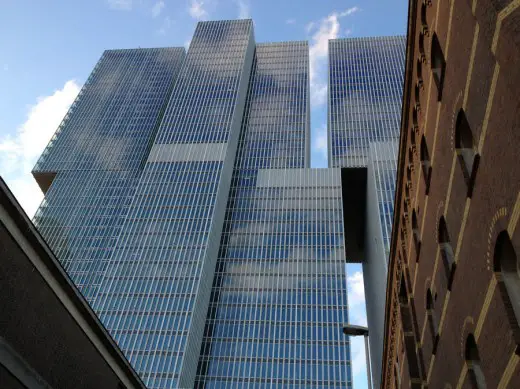
image courtesy of OMA; photography by Charlie Koolhaas
Ellen van Loon: “Efficiency has been a central design parameter from day one. The extreme market forces at play throughout the course of the project, far from being a design constraint, have in fact reinforced our original concept. The result is a dense, vibrant building for the city.”
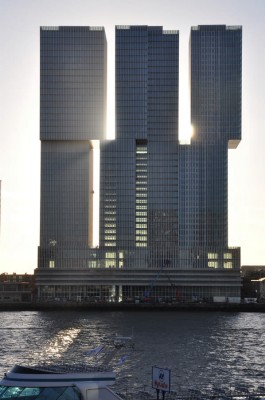
image courtesy of OMA; photography by Michel van de Kar
With the building’s completion, a critical mass has been established on the Kop van Zuid, realizing the long-established vision of a second city center south of the Maas. The building is named after one of the original ships on the Holland America Line, which from 1873 to the late 1970s transported thousands of emigrating Europeans bound for New York from the Wilhelmina Pier, next to which De Rotterdam is situated.
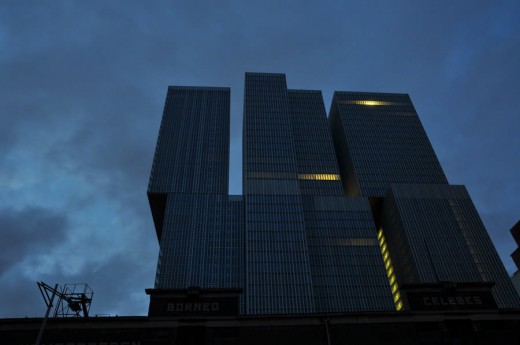
image courtesy of OMA; photography by Michel van de Kar
The three stacked and interconnecting towers of De Rotterdam rise 44 floors to a height of 150 meters and span a width of over 100 meters. Nevertheless, the building is exceptionally compact, with a mix of programs organized into distinct but overlapping blocks of commercial office space, residential apartments, hotel and conference facilities, restaurants and cafes.
Office employees, residents and hotel guests are brought together in conference, sport and restaurant facilities. The building’s shared plinth is the location of the lobbies to each of the towers, creating a pedestrianized public hub by means of a common hall.
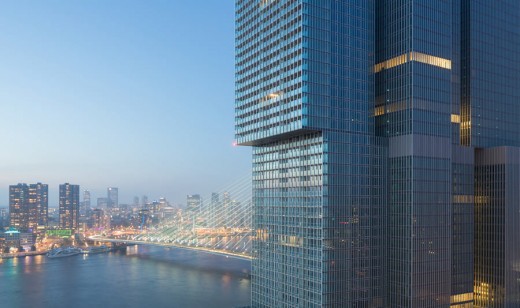
image courtesy of OMA; photography by Ossip van Duivenbode
Rem Koolhaas: “Despite its scale and apparent solidity, the building’s shifted blocks create a constantly changing appearance, different from every part of the city. The fact that it stands today represents a small triumph of persistence for the city, the developer, the contractor and the architects.”
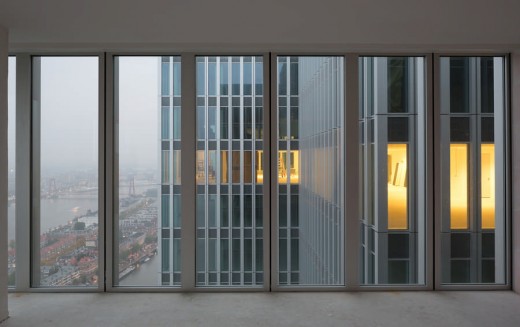
image courtesy of OMA; photography by Ossip van Duivenbode
The various phases of design and construction were supervised by partners-in-charge Rem Koolhaas, Ellen van Loon and Reinier de Graaf, and associate-in-charge Kees van Casteren. De Rotterdam is developed by MAB Development and OVG Real Estate.
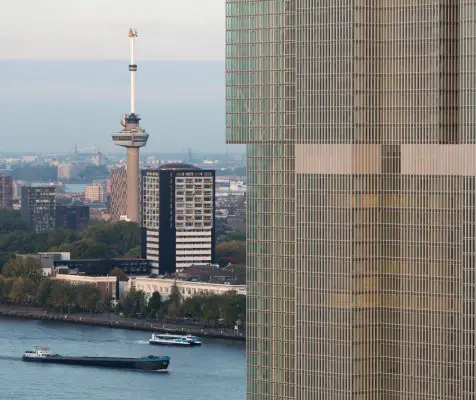
image courtesy of OMA; photography by Ossip van Duivenbode
De Rotterdam Building Design
De Rotterdam is conceived as a vertical city: three interconnected mixed-use towers accommodating offices, apartments, a hotel, conference facilities, shops, restaurants, and cafes. The project began in 1997. Construction started at the end of 2009, with completion in 2013.
The towers are part of the ongoing redevelopment of the old harbour district of Wilhelminapier, next to the Erasmus Bridge, and aim to reinstate the vibrant urban activity – trade, transport, leisure – once familiar to the neighbourhood. De Rotterdam is named after one of the ships on the Holland America Line, which departed from the Wilhelminapier in decades past, carrying thousands of Europeans emigrating to the US.
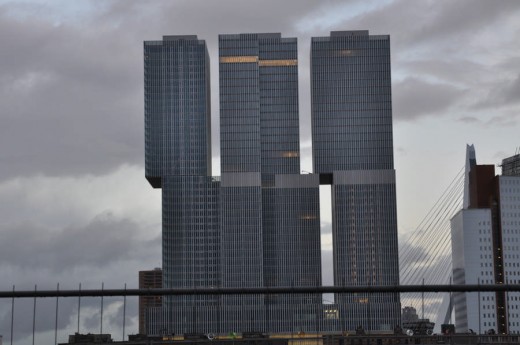
image courtesy of OMA; photography by Michel van de Kar
The three towers reach 150m high, with a gross floor area of approximately 162,000m2, making De Rotterdam the largest building in the Netherlands. OMA’s architectural concept produces more than sheer size: urban density and diversity – both in the program and the form – are the guiding principles of the project. De Rotterdam’s stacked towers are arranged in a subtly irregular cluster that refuses to resolve into a singular form and produces intriguing new views from different perspectives. Similarly, the definition of the building changes according to its multiple uses internally.
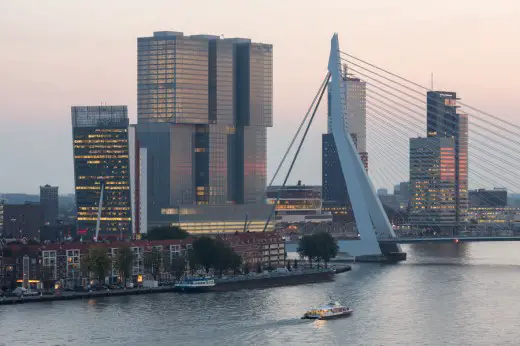
image courtesy of OMA; photography by Ossip van Duivenbode
The various programs of this urban complex are organized into distinct blocks, providing both clarity and synergy: residents and office workers alike can use the fitness facilities, restaurants, and conference rooms of the hotel. And these private users of the building have contact with the general public on the ground floor, with its waterfront cafes. The lobbies for the offices, hotel, and apartments are located in the plinth – a long elevated hall that serves as a general traffic hub for De Rotterdam’s wide variety of users.
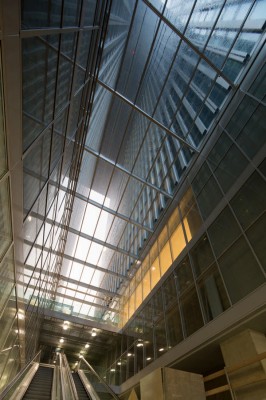
image courtesy of OMA; photography by Ossip van Duivenbode
De Rotterdam, The Netherlands – Building Information
Title: De Rotterdam
Project: A mixed-use vertical city
Status: Commission 1997, groundbreaking December 2009, completion November 2013
Clients: De Rotterdam CV, The Hague (Joint venture MAB, The Hague / OVG, Rotterdam)
Location: Rotterdam, Netherlands
Site: Former harbour waterfront between KPN tower and Cruise Terminal at Kop van Zuid
Program: Total 162,000m2: offices 72,000m2; 240 apartments 34,5000m2; hotel (278 rooms) / congress / restaurant 19,000m2; retail / F&B 1,000m2; leisure 4,500m2; parking (approx. 650 vehicles) 31,000m2
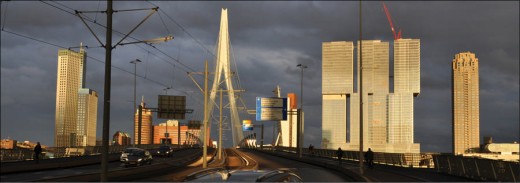
image courtesy of OMA; photography by Michel van de Kar
Partners in charge: Rem Koolhaas, Reinier de Graaf, Ellen van Loon
Associate in charge: Kees van Casteren
Team 1997–2001 (50% SD): Christina Beaumont, Stefan Bendiks, Frans Blok, Robert Cheoff, Bert Karel Deuten, Sharon Goren, Juan Guardetti, Jens Holm, Alex de Jong, Adam Kurdahl, Carolien Ligtenberg, Anna Little, Nuno Rosado, Saskia Simon, Johan de Wachter, Barbara Wolff
Team 2007–08 (50% SD – building permit): Chantal Aquilina, Eva Dietrich, Anita Ernödi, Markus Frank, Jonah Gamblin, Clarisa Garcia-Fresco, Alex de Jong, Michel van de Kar, Christoph Michael, Elida Mosquera, Mauro Parravicini, Ippolito Pestellini Laparelli, Raphael Pulido, Louise Sullivan, Olaf Turck, Manuel Villanueva, with: Chun Chiu, Duncan Flemington, Evangelos Kotsioris, Sören Martinussen, Nobuki Ogasahara, Theo Petrides, Benoit Schelstraete, Ian Schopa, Kyo Stockhaus, Joao Viera Costa, Luca Vigliero, Jussi Vuori, Jean-Paul Willemse
Team 2009–13 (construction phase / interiors): Michel van de Kar (associate), Marlies Boterman, Christoph Michael, with: Katrien van Dijk, Nathalie Gozdziak, Sai Shu, Saskia Simon, Tomas Dirrix, Erik de Haan, Jue Qiu, Pal Trodahl
Interiors hotel (2013): Saskia Simon, Marina Cogliani, Clive Hennessey, Yasuhito Hirose, Arminas Sadzevicius
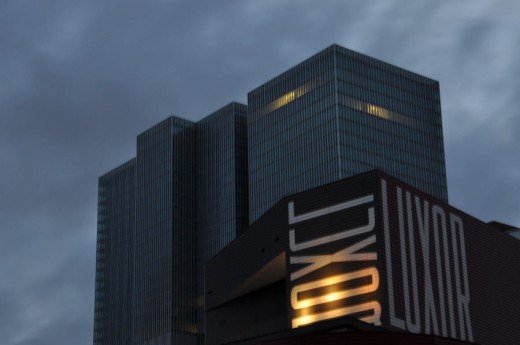
image courtesy of OMA; photography by Michel van de Kar
Collaborators
Building code consultant: ABT Bouwkunde, Velp / Delft
Structural engineer: Corsmit, Rotterdam
Structural advisor in SD phase: Arup, London
Service engineers: Techniplan, Rotterdam (offices, hotel) / Valstar Simonis, Rijswijk (apartments, plinth)
Façades: Permasteelisa, Middelburg (offices, hotel, plinth) / TGM, Asten (apartments)
Fire safety / building physics: DGMR, Arnhem
Lighting consultant ground floor / atrium: Arup, Amsterdam
Scenography / lighting consultants hotel: Ducks Scéno, Paris / Les Eclaireurs, Lyon
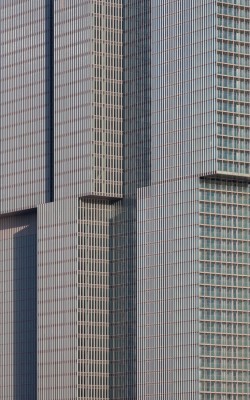
image courtesy of OMA; photography by Ossip van Duivenbode
Construction phase
Executive architect: B+M, The Hague
Elevators / escalators / building maintenance units: Kone, The Hague
MEP: Roodenburg, Krimpen aan den IJssel
Contractor: Züblin, Stuttgart / Antwerp / Vlaardingen
Reception desks ground floor: Smeulders, Nuenen
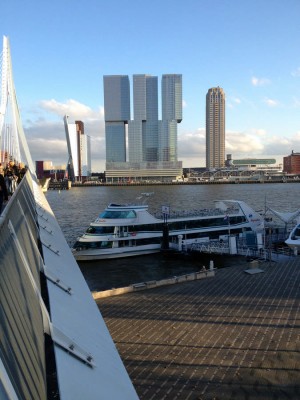
image courtesy of OMA; photography by Charlie Koolhaas
Facts
Gross Floor Area 162,000 m2
Plot size 107 m x 36 m (3,852 m2)
Height 150 m
Façade area 50,000 m2
Investment costs € 340,000,000
Weight of building 230,000,000 kg (line of cars of 1,200 km)
Concrete volume 74,000 m3 (12,000 concrete mixer trucks; line of 23km)
Weight of reinforcement 12 tons (12,000 kg)
Number of foundation piles 1,165 (total length of 24 km)
Number of doors 6,100
Number of elevators 24
Construction pit of 50,000 m3 is removed by ship
Daily 130 site workers during structural work (concrete)
Daily 600 site workers during peak in outfitting
In total more than 4,500 site workers have built the project.
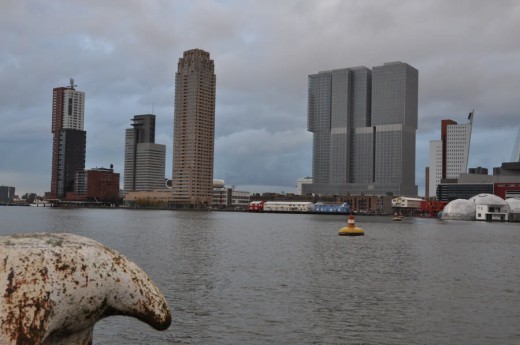
image courtesy of OMA; photography by Michel van de Kar
17 Nov 2012
De Rotterdam Photos
Next to the KPN-office (architect Renzo Piano) ‘DE ROTTERDAM’ of architect Rem Koolhaas (OMA) – exclusive photographs.
On the 15th of November 2012 the largest building in The Netherlands, ‘THE ROTTERDAM’, reached its highest point of 150 m – the tower seen across the city
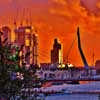
photograph © Ton Hermans
The ‘Crown’ goes up…
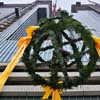
photograph © Ton Hermans
…Misty day in Rotterdam town…
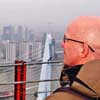
photograph © Ton Hermans
Speech by Rem Koolhaas at 150 m. high. ‘’This building could only have been build in Rotterdam’’
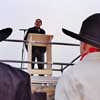
photograph © Ton Hermans
The Crown on top. Workers of Züblin Stuttgart in their traditional costumes.
In black the carpenters, in white the bricklayers…
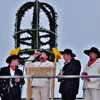
photograph © Ton Hermans
The tower from below…it takes another year to finish the whole building…
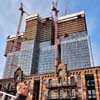
photograph © Ton Hermans
The architect

photograph © Ton Hermans
Rem Koolhaas on the roof of DE ROTTERDAM.

photograph © Ton Hermans
Rem Koolhaas on the 15th of November at the building

photograph © Ton Hermans
31 Mar 2012
De Rotterdam Images
This tower rises each week one floor behind the Noordereiland and will become the largest building by far in The Netherlands:
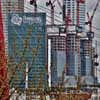
photograph © Ton Hermans
DE ROTTERDAM, seen behind an old warehouse – now in use as a home for students:
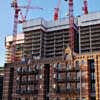
photograph © Ton Hermans
De Rotterdam Towers
Groundbreaking scheduled on OMA’s De Rotterdam, the largest building in the Netherlands
Rotterdam, July 10 2009 – a complex of three interconnected mixed-use towers designed by OMA, will go under construction in December this year, the developers MAB and OVG announced today.
The project is located in the old harbour district of Wilhelminapier, next to the iconic Erasmus bridge. The three stacked towers reach 150 metres high, producing a gross floor area of approximately 160,000m2, making De Rotterdam the largest building in the Netherlands.
OMA’s architectural concept produces more than sheer size: urban density and diversity – both in the program and the form – are the guiding principles of the project. De Rotterdam is conceived as a vertical city, accommodating offices, apartments, a hotel, conference facilities, gym, shops, restaurants, and cafes.
The towers are part of the ongoing redevelopment of Wilhelminapier, and aim to reinstate the vibrant urban activity – trade, transport, leisure – once familiar to the neighbourhood. De Rotterdam is named after one of the ships on the Holland America Line, which used to depart from the Wilhelminapier in decades past, carrying thousands of Europeans emigrating to the US.
The design for De Rotterdam started in 1997. OMA founder Rem Koolhaas said: “It’s a miracle that construction will finally begin. One of the positive outcomes of the economic crisis is the drop in the cost of materials and construction, which has given new energy to long running projects like this one.”
The project is led by OMA partners Rem Koolhaas, Ellen van Loon and Reinier de Graaf and the associate in charge is Kees van Casteren.
The total investment in the project is €340m. Completion is expected in 2013.
De Rotterdam towers – images / information from OMA
Location: Wilhelminapier, Rotterdam, The Netherlands
New Architecture in Rotterdam
Contemporary Rotterdam Architecture
Rotterdam Architecture Designs – chronological list
Rotterdam Architecture Tours – city walks and bike trips by e-architect
Also by OMA in Rotterdam:
Stadskantoor
Rotterdam Stadskantoor
Office for Metropolitan Architecture
Selected Buildings by Office for Metropolitan Architecture
Comments / photos for De Rotterdam Architecture page welcome

